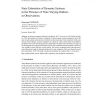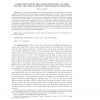256 search results - page 2 / 52 » State Aggregation and Population Dynamics in Linear Systems |
BMCBI
2011
13 years 11 days ago
2011
Background: High-throughput functional genomics technologies generate large amount of data with hundreds or thousands of measurements per sample. The number of sample is usually m...
INFORMATICALT
1998
13 years 8 months ago
1998
Abstract. In the previous papers (Masreliez and Martin, 1977; Novoviˇcova, 1987; Schick and Mitter, 1994) the problem of recursive estimation of linear dynamic systems parameters ...
SIAMCO
2010
13 years 7 months ago
2010
We consider linear-quadratic-Gaussian (LQG) games with a major player and a large number of minor players. The major player has a significant influence on others. The minor playe...
EELC
2006
14 years 14 days ago
2006
How does a shared lexicon arise in population of agents with differing lexicons, and how can this shared lexicon be maintained over multiple generations? In order to get some insig...
ICPR
2010
IEEE
13 years 7 months ago
2010
IEEE
Abstract—Learning dynamical systems is one of the important problems in many fields. In this paper, we present an algorithm for learning non-linear dynamical systems which works...



